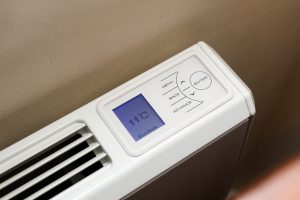
From 1st January 2018, all local space heaters manufactured for sale in the EU must comply with a minimum efficiency standard under Lot 20 of the Energy Efficiency Directive. Christian Hadley, Head of Product Marketing for Glen Dimplex Heating & Ventilation, explains what it means for social housing providers.
Despite the uncertainty of Brexit, one thing remains constant across the EU — our need to use energy more efficiently. The EU is committed to achieving a 20% energy saving by 2020 and if this is to happen, all member states (including those that intend to leave) must continue to drive energy efficiency at all stages of the supply chain, from production to final consumption. And the social housing sector has its part to play.
As part of this commitment, a number of ‘product lots’ have already been rolled out as part of the 2012 Energy Efficiency Directive (EED), covering everything from televisions, lightbulbs and washing machines, to machine tools and compressors. The latest was Lot 20, focusing on local space heaters — and when you consider that more than half of energy consumed in our homes is used to heat water and space, it is easy to see the difference it could make.

What is Lot 20?
Lot 20 of the EED (2015/1188) states that all local space heaters manufactured for sale in the EU after 1st January 2018 which use electricity, gaseous or liquid fuels, must comply with a minimum efficiency standard. This includes electric radiators, electric underfloor heating and electric and gas fires.
Local room (or space) heating products are defined as appliances that provide heat to indoor spaces by generating heat in the location within which they are situated. Like other product categories, the aim is to rule out inefficient technologies and reduce the energy used in our homes, helping to achieve our overall carbon reduction targets.
How will compliance be achieved?
Lot 20 requires that the consumption and emissions for local space heaters must be reduced by applying ‘existing, non-proprietary technologies’ without an increase in the combined costs of purchasing and operating the products. In simple terms, this means driving efficiency of local space heaters by regulating their operation through the use of intelligent timers and controls.
There are a series of features that may be incorporated into relevant products, all of which will ‘score’ differently according to the ‘correction factor’ specified within the regulations, helping manufacturers to meet the required standards. For example, Lot 20 requires entry-level products to include at least mechanical and electrical room temperature controls, with day or week timers. These have been available for many years, though often purchased as add-ons. However, with recent advancements in smart technologies, there is a real opportunity for electric space heaters, in particular, to drive efficiency through intelligent, adaptive controls.
“Lot 20 requires that the consumption and emissions for local space heaters must be reduced by applying ‘existing, non-proprietary technologies’ without an increase in the combined costs of purchasing and operating the products.”
Dimplex’s Q-Rad electric radiator, for example, a heater which was already Lot 20 compliant even before the regulations came into force, includes ‘Eco-Start’, a delayed-start anticipatory control — the heater, rather than the user, decides when to turn on to ensure target temperature is achieved at exactly the right user-selected time.
Why does this matter to social housing?
The social housing sector is undergoing a dramatic period of disruption. Budget cuts, property ownership and an uncertain political landscape are all hot topics, but there is perhaps one issue more than any other which demands attention — energy efficiency.
Remember, private and social rented properties have a far higher proportion of electrically heated homes than owner-occupied and across all tenures between 30% and 40% of flats are electrically heated. It is clear to see the value that improved efficiency of electric heating appliances can deliver for the sector, especially in the current climate.
In essence, Lot 20 will deliver a better standard of product. Entry-level products will have integral controls, whilst manufacturers like Glen Dimplex Heating & Ventilation have also worked hard to incorporate the latest technology into the controls of higher spec appliances. Technology like anticipatory control and open window detection simply did not exist a few years ago.
The regulations do not require universal upgrades of heating systems in social rented properties. But rest assured, when the time comes to upgrade electric heating appliances, whether in one property or an entire portfolio, the resulting product redesigns will save money for residents and reduce emissions for providers. In many cases, there will be a business case for upgrading sooner rather than later, because it could pay back sooner than you think.
What else do you need to know?
The regulations apply to applicable local space heaters manufactured for sale in the EU after 1st January 2018, but there will inevitably be a period where products manufactured before this date will still be available as stocks run down. Speak to your contractors and chosen manufacturer to ensure you are investing in the right solution to protect the long-term efficiency of your properties.








